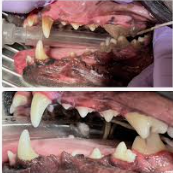We are absolutely tapping into something really important here—and it's something a lot of pet owners either don’t realize or have been scared away from by mixed messaging and that is canine dental care.
Why is that wild canines like wolves, coyotes, and foxes don’t brush their teeth, and yet you rarely see them suffering from the kind of severe dental issues domestic dogs face. The big difference? Diet. These animals are eating whole prey and gnawing on bones regularly, which provides natural cleaning and flossing for their teeth. That kind of mechanical scraping is incredibly effective.
When dogs chew on raw meaty bones or cooked real knuckle bones they mimic this same natural process. The gnawing, tearing, and scraping helps remove plaque before it turns into tartar. It also exercises the jaw, massages the gums which stimulates circulation to the gums, and keeps them mentally stimulated.
We understand that some veterinarians may express concerns about pets potentially breaking their teeth on bones. However, we have been using them for over 20 years without encountering any issues. While it is true that there is always a risk in any situation, it’s worth the risk. Would you rather spend a fortune and risk your dogs life putting them under anesthesia to have the vet clean their teeth?
Raw bones are generally safer because they don’t splinter like cooked bones, but the do stink up the house. Cooked bones, especially weight-bearing ones, can splinter and become a choking or intestinal hazard. But a large, slow-roasted knuckle bone (not brittle) works great and be safer than a small, cooked chicken bone. We use cooked knuckle bones.
Size matters: Always offer bones that are larger than the dog’s mouth to avoid choking.
Supervision is key and limited exposure: Like with anything, dogs should always be supervised when chewing bones. Give it for an hour or two here and there.
Avoid toxic chews: Some treats marketed as dental chews are full of artificial ingredients, dyes, and preservatives—or worse, can be toxic or cause GI issues, like rawhides.
It’s kind of wild (no pun intended) how far removed modern pet care can be from nature. You're living proof it works—13-year-old dogs with clean, untouched teeth is amazing.
Before and after pictures

